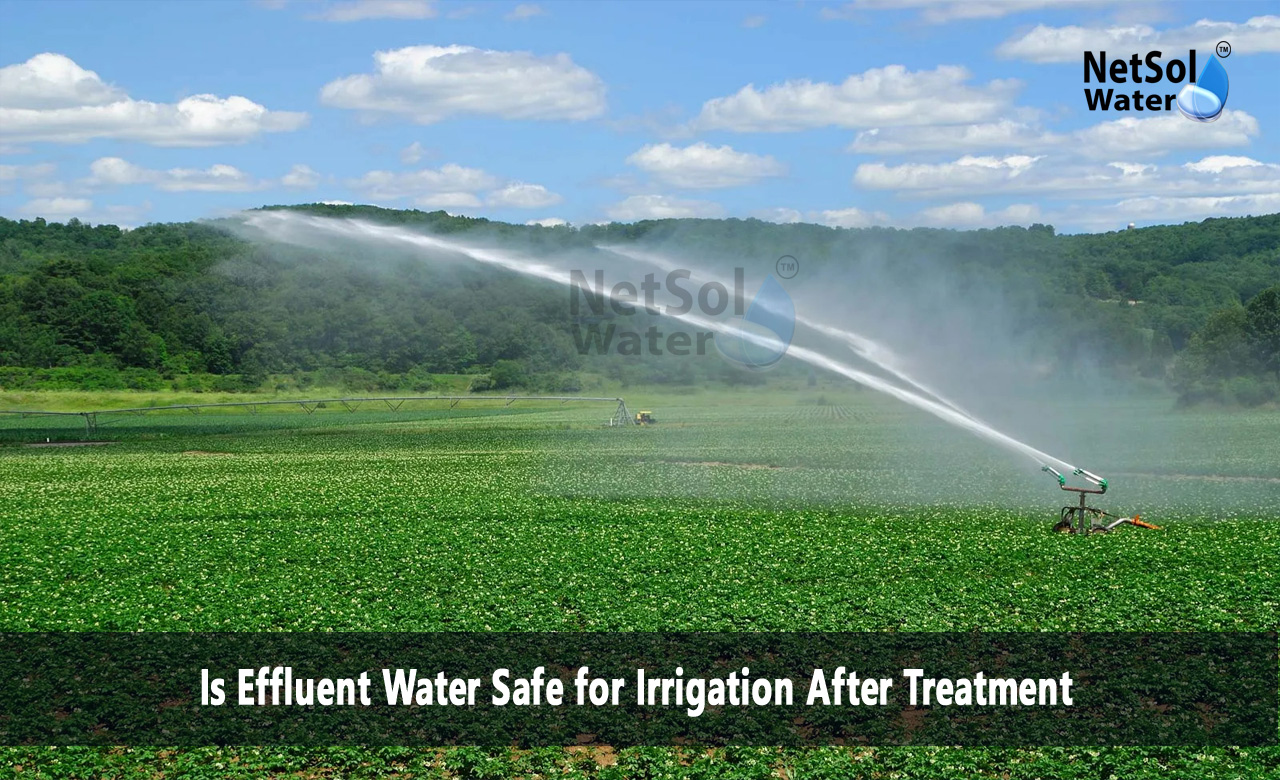Is Effluent Water Safe for Irrigation After Treatment?
Untreated effluent water carries waste from factories and homes. This waste can harm soil and crops if farmers do not treat it first. In dry regions treated effluent water can become a lasting water source. We explore how safe this treated water is for irrigation. We also show how Netsol Water applies advanced design to each system. We will covers the nature of effluent water, the ways to clean it and its benefits for farms. We explain the steps needed to protect soil health and crop yields.
What is Effluent Water and Its Risks?
Effluent water may contain materials that hurt plants and soil. It carries solids dissolved chemicals and germs. We start by noting the key risks for irrigation.
Composition of Untreated Effluent
Untreated effluent water holds particles from many sources. It can contain sand silt and organic matter. Often it also has heavy metals and chemical residues. These materials can block pipes or coat roots. If farmers use this water on crops they may see stunted growth or poor yield. Soil spaces can fill with solids and plants will struggle to breathe.
Health Haz?ards and Environmental Impact
Effluent water may carry bacteria, viruses and parasites. Workers and consumers face health risks if they touch or eat crops irrigated by this water. Pathogens can travel from farm fields to nearby streams and lakes. Fish, birds and other wildlife may suffer. Polluted runoff can reach drinking water sources as well. These threats stress the need for proper effluent treatment plants.
Treatment Methods for Effluent Water
Treating effluent water makes it fit for irrigation uses. Well designed systems remove harmful substances.
Physical Treatment Processes
Physical steps use barriers and forces to clear solids from water. Screens trap large debris first. Settling tanks let heavy particles sink. Filters remove finer particles before the water moves on. These steps protect pumps, pipes and crop roots. Clean water also reduces maintenance on irrigation systems.
Biological Treatment Processes
Biological treatment uses microbes to digest organic compounds. In the presence of oxygen, bacteria convert waste to harmless byproducts. Oxygen helps microbes break down pollutants quickly. In systems without oxygen, microbes still process waste and produce biogas. Both systems cut organic content by a large margin. Operators monitor pH and temperature to keep microbes active.
Chemical Treatment Processes
Chemical methods target dissolved pollutants and germs. Coagulants bind tiny particles so filters catch them. Disinfectants like chlorine or ozone kill bacteria and viruses. Advanced oxidation breaks complex chemicals into simpler harmless forms. Plant designers set chemical levels with care to protect soils and crops.
Quality Standards and Monitoring
Authorities set strict limits for treated effluent water. Meeting these standards ensures safe irrigation.
Regulatory Guidelines
Regulators limit factors such as BOD, TSS and pathogen counts. They may allow certain nutrients if crops need them. Some regions cap salt content to guard soil health. Netsol Water fits each plant with sensors and alarms. Operators get real time alerts if water quality falls.
On-Site Testing and Control
Field tests check pH, conductivity and turbidity on the spot. Farmers draw samples for lab analysis of metals or microbes. This data helps operators spot issues early. If levels rise they increase treatment or hold back use. Good records show compliance and help with audits.
Benefits of Using Treated Effluent Water for Irrigation
Reusing treated effluent water gives farms economic environmental and operational gains. We highlight the main advantages that treated water brings to irrigation.
Reliable Water Supply
Water scarcity affects many regions and seasons. Treated effluent water stays available when fresh water runs low. Farmers plan irrigation without risk of rationing. Netsol Water plants include storage tanks and flow controls. These features match water supply to daily needs.
Nutrient Recovery
Treated water often contains nitrogen and phosphorus that crops need. Using this water lowers the need for chemical fertilizers. That cuts farm expenses and lowers emissions. Recycling nutrients keeps soil fertile and supports farm sustainability.
Environmental Protection
Using treated effluent eases demand on rivers and aquifers. It lowers discharge to natural waterways. This practice guards fish habitats and water quality. Farmers and communities benefit from a circular water system.
Challenges and Considerations
Irrigating with treated effluent water needs planning and management. Users must address technical and social hurdles. We review the main challenges farms face.
System Complexity and Cost
Building a treatment plant requires capital and expertise. Operators need training to run pumps and reactors. Treatment uses energy and some chemicals. Netsol Water guides clients to systems that fit their scale and budget. We offer training and maintenance plans.
Soil and Crop Suitability
Not all soils and crops suit effluent irrigation. High salt levels can harm sensitive plants. Sandy soils may let pollutants seep into groundwater. Clay soils may clog with waste solids. Agronomists test soil and water before use. Farmers adjust crop choice or rotation to match conditions.
Community and Public Perception
Neighbours may worry about odours or health risks. Clear buffer zones and proper signage help ease fears. Sharing water quality results and inviting visits builds trust. Netsol Water helps clients prepare outreach plans and reports.
Conclusion
Netsol Water leads in effluent treatment plant manufacturer that turn waste into a safe irrigation resource. Proper treatment removes solids, chemicals and germs. Farms gain steady water supply, recover nutrients and protect the environment. With solid planning and the right partner these systems fit many farm needs. Contact Netsol Water today to learn more about effluent treatment plants and schedule a consultation.



